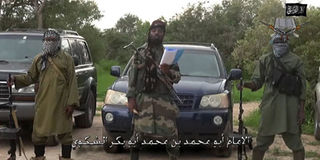Nigerian soldiers and villagers flee in fear of Boko Haram

A screen-grabs taken on Sunday from a video shows the leader of the Nigerian Islamist extremist group Boko Haram, Abubakar Shekau (centre), delivering a speech at an undisclosed location. He said he has created an Islamic caliphate in a north-east Nigeria town seized earlier this month. “Thanks be to Allah who gave victory to our brethren in (the town of) Gwoza and made it part of the Islamic caliphate,” Abubakar Shekau said in the 52-minute video. AFP PHOTO
What you need to know:
- The attack on Gamboru Ngala came after the town was almost entirely destroyed in a devastating assault in May that left more than 300 people dead and prompted outrage at the lack of military response.
- Nigerian soldiers were said to be among the exodus, according to locals and the Cameroon military, who said “more than 450” had fled their posts on Sunday from elsewhere in Borno State for fear of Boko Haram attacks.
- Boko Haram, which has been blamed for more than 10,000 deaths in a five-year-old uprising, has in recent weeks sought to take over a number of towns in Nigeria’s Borno State.
More than 450 Nigerian troops have fled to neighbouring Cameroon, fearing attacks by Boko Haram terror group.
According to the Cameroonian military, the Islamist group overran a border town in northeast Nigeria, and the residents and soldiers fled in the latest indication of the militants’ growing ability to strike at will.
The attack on Gamboru Ngala came after the town was almost entirely destroyed in a devastating assault in May that left more than 300 people dead and prompted outrage at the lack of military response.
Many residents sought refuge from the latest strike across the border in the northern Cameroon town of Fotokol, where Cameroonian troops were sent, a security service source said.
Nigerian soldiers were said to be among the exodus, according to locals and the Cameroon military, who said “more than 450” had fled their posts on Sunday from elsewhere in Borno State for fear of Boko Haram attacks.
Nigeria’s military dismissed the claims and maintained that the troops were “charging through the borders in a tactical manoeuvre” when they found themselves on Cameroonian soil.
The country has one of Africa’s biggest militaries and has contributed to Ecowas military operations in West Africa. Several residents who made it across the frontier said the militants had taken over the town after the assault began at about 5.30am with fierce gunfire throughout the day. Frightened residents locked themselves in their homes.
In Fotokol, residents also reported hearing “intense” fighting.
TAKE OVER POLICE POST
“Boko Haram is in control of Gamboru Ngala. They have taken over the Harmony (military) Camp, the police station and the customs barracks near the border,” Idris Gwoni said on Monday evening, in an account supported by other locals.
“They encountered stiff resistance from the military, who engaged them in gun battle for several hours, but the soldiers were subdued and fled.
“The insurgents have not touched any civilians and allow residents to stay or leave. I decided to leave because I can’t trust Boko Haram.”
Cameroon said on August 18 that it had closed its vast border with Nigeria to guard against the spread of Ebola, which has caused five deaths in the country’s financial capital, Lagos, in the far south-west.
But few believed that Cameroon had the resources needed to seal all the possible crossing points along the roughly 1,600-kilometre frontier.
The Nigerian military was quick in its efforts to stamp out any impressions that is military had defected or fled from a fight because it would create an impression that Boko Haram is stronger.
It says the disarming of its soldiers by Cameroon was standard procedure and the soldiers had since been freed and were heading back to their units.
But it has been unable to wipe out Boko Haram, nor has it been successful in taking back territory now under the terror group. About 300 girls abducted by the Islamists are still missing, despite a rescue mission to free them.
Boko Haram, which has been blamed for more than 10,000 deaths in a five-year-old uprising, has in recent weeks sought to take over a number of towns in Nigeria’s Borno State.
GWOZA TOWN UNDER BOKO HARAM
The apparent holding strategy is a shift from its previous hit-and-run tactics, which has increasingly targeted civilians and seen whole towns and villages razed.
The group’s leader, Abubakar Shekau, declared in a video on Sunday that Gwoza town, south-west of Gamboru Ngala, was now under an Islamic caliphate.
Local officials and residents in Borno say Boko Haram may be in control of a key road that connects Gamboru Ngala to the state capital Maiduguri.
Establishing which parts of the area have in fact fallen into rebels hands is difficult in the remote region, where travel is dangerous and prolonged fighting has hit mobile phone networks.
Nigeria’s military dismissed Shekau’s video claim as “empty”, maintaining that the country’s sovereignty remained intact.
But that assertion is in conflict with multiple reports indicating that Boko Haram controls several towns in Borno and at least one in neighbouring Yobe State.
Shekau did not develop his claims about Gwoza being part of the Islamic caliphate.





